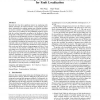Free Online Productivity Tools
i2Speak
i2Symbol
i2OCR
iTex2Img
iWeb2Print
iWeb2Shot
i2Type
iPdf2Split
iPdf2Merge
i2Bopomofo
i2Arabic
i2Style
i2Image
i2PDF
iLatex2Rtf
Sci2ools
142
click to vote
PASTE
2010
ACM
2010
ACM
Learning universal probabilistic models for fault localization
Recently there has been significant interest in employing probabilistic techniques for fault localization. Using dynamic dependence information for multiple passing runs, learning techniques are used to construct a probabilistic graph model for a given program. Then, given a failing run, the probabilistic model is used to rank the executed statements according to the likelihood of them being faulty. In this paper we present a novel probabilistic approach in which universal probabilistic models are learned to characterize the behaviors of various instruction types used by all programs. The universal probabilistic model for an instruction type is in form of a probability distribution that represents how errors in the input (operand) values are propagated as errors in the output (result) of a given instruction type. Once these models have been constructed, they can be used in the analysis of any program as follows. Given a set of runs for any program, including at least one passing and ...
Related Content
| Added | 10 Jul 2010 |
| Updated | 10 Jul 2010 |
| Type | Conference |
| Year | 2010 |
| Where | PASTE |
| Authors | Min Feng, Rajiv Gupta |
Comments (0)

